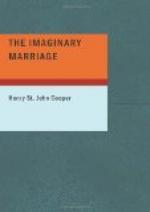Marjorie felt that she had lifted a weight from her mind when she put this letter in the post.
Long, long ago Joan had acquitted Hugh of any intention to offend or annoy her by the use of her name. Yet why had he never told her the truth, told her that it had never been his doing at all? She read Marjorie’s letter, and then thrust it away from her. Why had he not written this? Did he care less now than he had? Had she tired him out with her coldness and her pride? Perhaps that was it.
Yesterday Ellice had come over on the old bicycle—Ellice with shining eyes and pink cheeks, glowing with happiness and joy, and Ellice had hugged her tightly, and tried to whisper thanks that would not come.
She was happy now. Marjorie was happy. Only she seemed to be cut off from happiness. Why had he gone without a word, just those few written lines? He had not cared so much, after all.
And so the days went by. Joan wrote a loving, sympathetic letter to Marjorie. She quite understood, and she did not blame Hugh; she blamed no one.
It was a long letter, dealing mainly with her life, with the village, with the things she was doing and going to do. But of the future—nothing; of the past, in so far as Hugh Alston was concerned—nothing.
And when Marjorie read the letter she read of an unsatisfied, unhappy spirit, of a girl whose whole heart yearned and longed for love, and whose pride held her in check and condemned her to unhappiness.
Scarcely a day passed but Joan drove over to Little Langbourne. Philip Slotman came to look for her, and counted it a long unhappy day if she failed him; but it was not often.
She had discovered that he was well-nigh penniless, and that it would be months before he would be fit to work again. And so she had quietly supplied all his needs.
“When you are well and strong again, you shall go back. You shall have the capital you want, and you will do well. I know that. I shall lend you the money to start afresh, and you will pay me back when you can.”
“Joan, I wonder if there are many women like you?”
“Many better than I,” she said—“many happier.”
At Buddesby she was welcomed by a radiant girl with happy eyes, a girl who could not make enough of her, and there Joan saw a home life and happiness she had never known—a happiness that set her hungry heart yearning and longing with a longing that was intolerable and unbearable.
“Send for me, and I will come,” he had written; and she had not sent. She would not, pride forbade it, and yet—yet to be happy as Ellice was happy, to feel his arms about her, to rest her head against his breast, to know that during all the years to come he would be here by her side, that loneliness would never touch her again.
“I won’t!” she said. “I won’t! If he needs me, it is he who must come to me. I will not send for him.”




